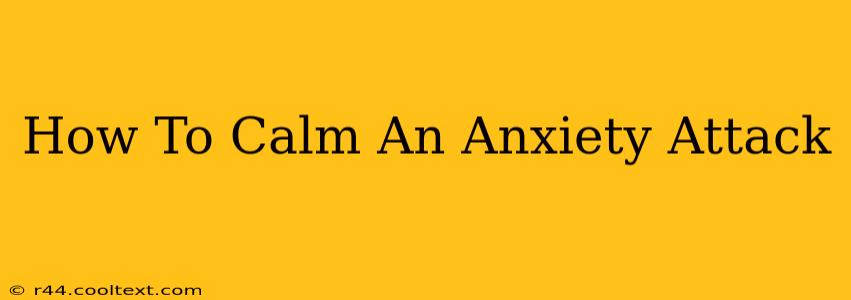Anxiety attacks can feel overwhelming, leaving you breathless and terrified. But understanding how to manage them is the first step towards regaining control. This guide provides practical techniques to help you calm an anxiety attack quickly and effectively. Knowing these strategies can significantly reduce the fear and impact of future attacks.
Recognizing the Signs of an Anxiety Attack
Before we dive into calming techniques, it's crucial to recognize the symptoms of an anxiety attack. This awareness allows for quicker intervention and better self-management. Common signs include:
- Rapid heartbeat: Your heart races uncontrollably.
- Shortness of breath: You may feel like you're suffocating or can't get enough air.
- Sweating: Excessive perspiration is a common physical symptom.
- Trembling: Your body may shake uncontrollably.
- Feeling of choking: A sensation of tightness in your throat.
- Chest pain: Discomfort or pain in your chest area.
- Nausea: Feeling sick to your stomach.
- Dizziness or lightheadedness: Feeling unsteady or faint.
- Chills or hot flashes: Experiencing sudden changes in body temperature.
- Fear of losing control or dying: This overwhelming fear is a hallmark of an anxiety attack.
Immediate Actions to Calm an Anxiety Attack
When an attack hits, acting quickly is key. These techniques are designed to help you ground yourself and manage the physical symptoms:
1. Practice Deep Breathing Exercises:
This is arguably the most effective immediate response. Deep, slow breaths help regulate your nervous system. Try the 4-7-8 technique: Inhale deeply through your nose for a count of four, hold your breath for seven, and exhale slowly through your mouth for eight. Repeat several times.
2. Grounding Techniques:
Grounding techniques help bring you back to the present moment. Try these:
- 5-4-3-2-1 Method: Name five things you can see, four things you can touch, three things you can hear, two things you can smell, and one thing you can taste.
- Focus on your senses: Pay close attention to your surroundings. Describe the textures, colors, sounds, smells, and tastes around you.
3. Physical Activity:
Gentle movement can help release tension. A short walk, some stretching, or even just moving your fingers and toes can make a difference.
4. Progressive Muscle Relaxation:
Systematically tense and release different muscle groups in your body, starting with your toes and working your way up. This helps relieve physical tension associated with anxiety.
Long-Term Strategies for Anxiety Management
While these immediate actions can help during an attack, long-term strategies are crucial for preventing future episodes.
1. Therapy:
Cognitive Behavioral Therapy (CBT) and other therapeutic approaches can help you identify and manage the root causes of your anxiety. A therapist can provide personalized strategies and coping mechanisms.
2. Lifestyle Changes:
- Regular Exercise: Physical activity is a natural mood booster and stress reliever.
- Healthy Diet: Nourishing your body with healthy foods supports both physical and mental well-being.
- Sufficient Sleep: Aim for 7-9 hours of quality sleep each night.
- Mindfulness and Meditation: Regular practice can enhance self-awareness and reduce stress.
- Limit Caffeine and Alcohol: These substances can exacerbate anxiety symptoms.
3. Support System:
Connecting with friends, family, or support groups can provide emotional support and reduce feelings of isolation.
When to Seek Professional Help
While these techniques are helpful, it's crucial to seek professional help if your anxiety attacks are frequent, severe, or significantly impacting your daily life. Don't hesitate to reach out to a doctor or mental health professional. They can provide a proper diagnosis and recommend appropriate treatment options. Your mental health matters.
This comprehensive guide provides valuable tools and strategies for managing anxiety attacks. Remember, you're not alone, and help is available. By implementing these techniques and seeking professional support when needed, you can take control of your anxiety and live a more fulfilling life.

